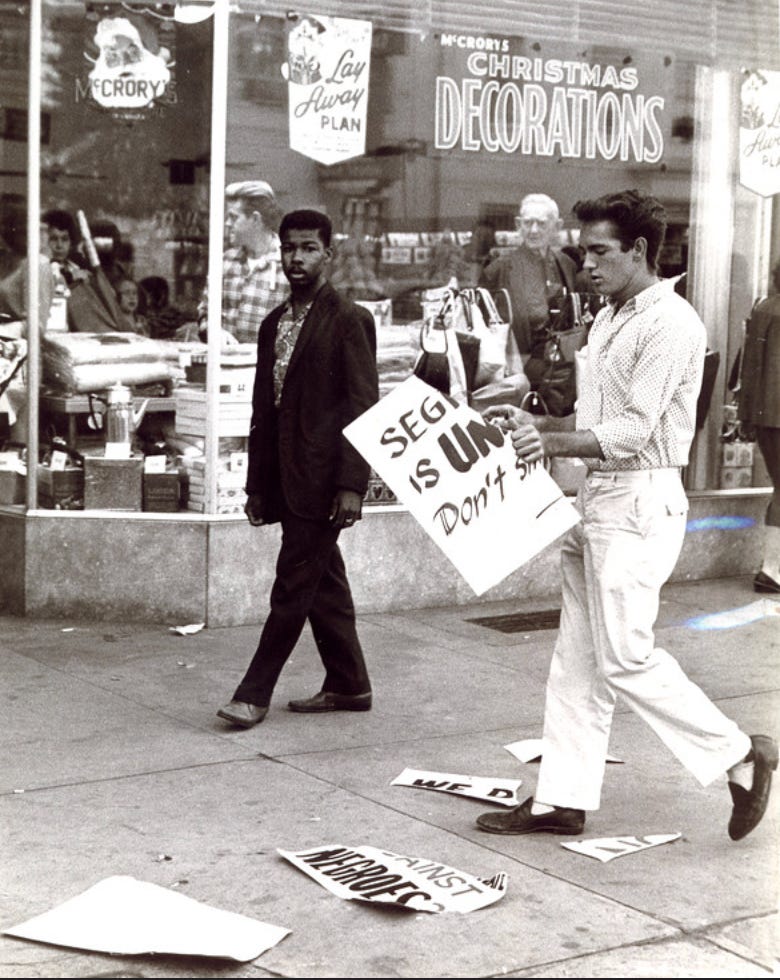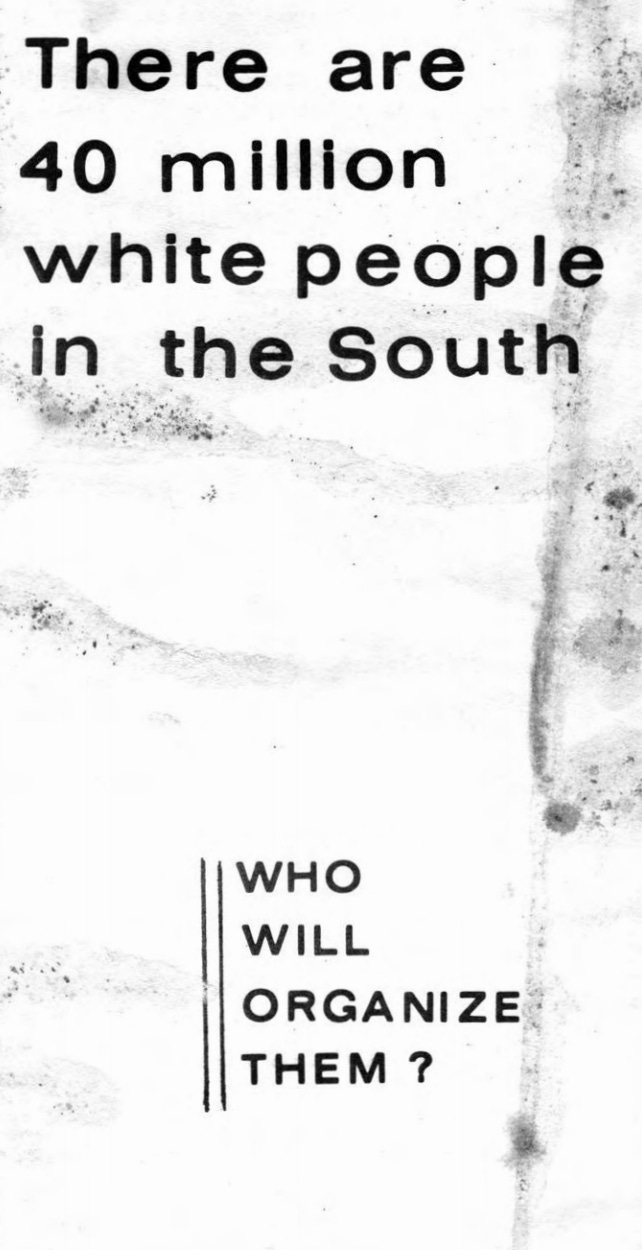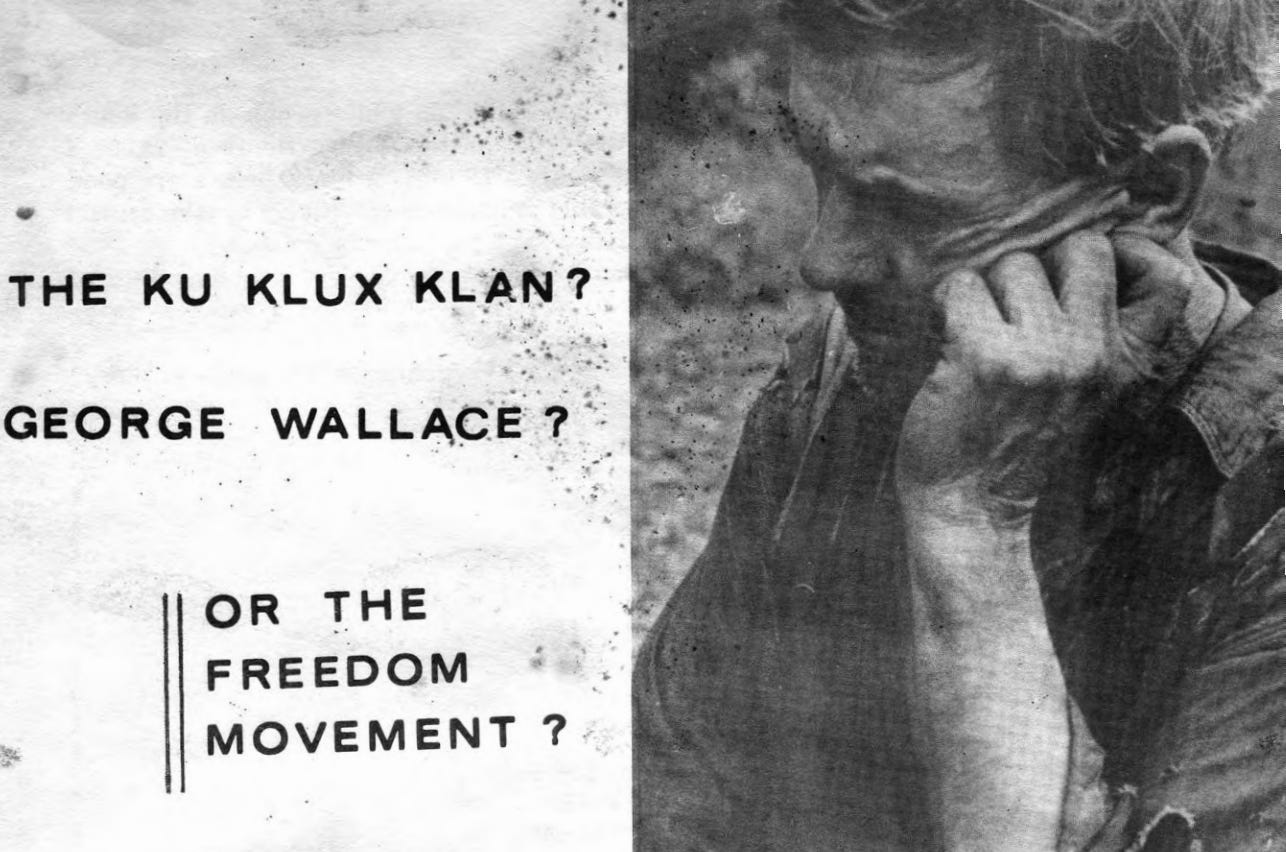No, really. Are you ready to organize with white people for racial justice?
There is so much work ahead. But this is the step we always seem to skip

Notes:
This issue is written with gratitude to activists in Minnesota. I just donated to the Black Vision Collective and encourage you to do the same.
I have filled your inboxes more than normal this week. Thank you for your understanding. Additionally, thanks for your patience with errors and typos and a more preachy and less reflective tone— I felt like I needed to write today but I’m still solo parenting so that meant squeezing this into my kids’ afternoon rest time.
“One of the most disturbing things about almost all white supporters of the movement has been that they are afraid to go into their own communities – which is where the racism exists – and work to get rid of it. They want to run from Berkeley to tell us what to do in Mississippi; let them look instead at Berkeley… Let them go to the suburbs and open up freedom schools for whites.”
-Stokely Carmichael
I’m writing this on Friday May 29th, 2020. Last night was filled with fires at police precincts and journalists under arrest and the President of the United States encouraging his armed forces to kill civilians.
I don’t know what will happen over the next few nights in Minneapolis. I don’t know what will happen tonight in other cities. I am hoping, praying, begging for the best.
I also don’t know how long we’ll be fixated on this specific moment. On George Floyd. On buildings on fire in South Minneapolis. On this particular set of viral resources and bail funds and images of white supremacy depicted in triangular form.
What I do know is that at some point this moment will end. There will be commissions formed in Minneapolis and many, many meetings will be held. Cops may or may not be found guilty. The commemorative march next year will be fairly well attended. And here’s what is most likely to happen next:
In your community, the percentage of white people who are more concerned about “rioters and thugs” than “police killing unarmed Black people” will remain the same as it did before this week.
In your community, the percentage of white people who would call the cops because they feel threatened by a Black man living life in their vicinity will remain the same as it did before this week.
In your community, the percentage of white people who support reparations, amnesty for undocumented immigrants, full respect for treaty rights with Indigenous nations or even the ability of Asian Americans to exist during a pandemic without being coughed on or cursed out will remain the same as it did before this week.
I could go on. I could break it down by the percentage of white CEOs willing to pay the taxes necessary to sustain a true social safety net or the percentage of white parents willing to send their kids to a mostly Black and Brown public school without gentrifying the PTA in their own image or the percentage of white-led police unions willing to fully rethink the way they do business. I haven’t even mentioned the percentage of white Wisconsinites, Pennsylvanians and Michiganders who are willing to vote differently than they did in the last Presidential election, but you get the point.
And that means that, unless we do something differently, we’ll be right back here before too long with a different heinous tragedy and a different set of bail funds and a different set of viral images to share but with the same damn problem.
There is so much work to be done, of course. That’s what you get for living in the middle of a seven hundred year old experiment in cruelty and human division. Those of us who are white and desire a better world have already been presented with laundry lists of tasks, all of which are deeply necessary. We must direct money, power, attention and resources to BIPOC-led efforts. We must reflect and read and listen. We must center BIPOC voices and learn to step aside and let others lead in heterogenous spaces. We must do all the learning necessary to stop being such pains in the rear ends to Black, Brown, Asian and Indigenous people in our lives.
But most of all, I’d argue, we have to organize our own cocooned, homogenous spaces. Our marriages. Our friendships. Our churches and synagogues. Our workplaces. Our schools. Our neighborhoods.
You’ll notice I’m using (and over-using) the term “organize” here, rather than alternatives such as “confront racists,” “punch Nazis,” “yell and scream” or “get into arguments on Facebook.” Here’s what I mean when I say organizing (and you’ll forgive me for simplified butchering of the work of seasoned organizers— if you’d rather truly get educated, I highly recommend the work of Jane Mcalevey ):
Running strategic campaigns with clear goals and objectives.
Running those campaigns with an explicit desire to welcome new people in, to help people who haven’t discovered their ability to contribute to collective power projects to find their voice in and passion for this work.
Put even more clearly: I’m talking about bringing folks into this work who aren’t in it currently. I’m talking about actually making a tangible difference in the number of white people in your community living lives of reflection, learning and action for racial justice.
So let’s say, for example, that you’ve been reflecting and reading action lists and all that and have decided on a personal commitment you’re ready to make. Maybe you’re going to spend a certain amount of your money at Black-owned businesses. Maybe you’re going to join an online study circle led by a Black educator or finally crack open that Ibram X. Kendi or Ijeoma Oluo book. Maybe you’re going to send your five year old to your Title I neighborhood school or talk to your pastor about your congregation supporting prison abolition work or get your boss to commit to the hiring, promotion and retention of a majority BIPOC team. Maybe, just maybe, you’re a white cop that is uncomfortable with your colleagues’ unwillingness to change or a white Republican who can’t stand the liberals but, when you’re honest yourself, is uncomfortable with Trump as well.
Great! Whatever that instinct, that passion… do it. Now comes the next step: Set an ambitious but achievable goal for the number of white people in your life that you’d like to take that step with you. Map your networks and make a plan to help move them. Listen and share and persuade, one conversation at a time. Once you’ve got your group, live the ups and downs of your new commitment together. Then, after a length of time (a few months perhaps) set a larger goal together— one that is more ambitious, brings even more white people in and digs deeper into networks you’d assume to be recalcitrant.
It’s ok if you feel like you don’t know how to do this. As somebody who has gotten to watch multiple white people discover that they have far more talents as racial justice organizers than they ever imagined, the initial trepidation is normal. Here are a few offerings to get you started:
Coaching and supporting white people to organize their own communities is literally my job. I am currently launching a (free) cohort of white people in different communities who want to learn together and hold each other accountable for organizing projects. If you’re interested, please fill out this form or email me at garrett@barnraisersproject.org.
I’ve written about how to change white people’s hearts and minds on race (regardless of politics, class, geography, etc.) both here and here (for the latter link, the actionable stuff is at the bottom).
Showing Up For Racial Justice has recently really impressed me with the ways that they’re clearly evolving their model to support base-building. The action steps they released this week offer a good entry point to see how they’re thinking about that work right now.
If you’re interested in models of workplace-based white affinity/organizing groups that maintain close accountability with BIPOC groups, I’ve learned a lot by studying the Building Anti-Racist White Educators in Philadelphia model.
I can’t speak highly enough of the movement-building education work that Training for Change offers.
Integrated Schools helps white parents make the decision to stop the cycle of white flight and resource hoarding in our education system.
We are all, us white people, deeply flawed and still learning. We all, all of us, need to keep listening and keep stepping aside and redirecting resources. But if that’s all we do, we may succeed in helping ourselves cause less individual harm but, collectively, we’ll still be in this exact same place again. There are so many risks in white people focusing on organizing each other. We risk being held back by the weight of our own collective ignorance. We risk losing connections to those to whom we need to be accountable. We most definitely will be clumsy and weird and sometimes not particularly effective.
The question is: Do we want a better world or do we just want the anger and frustration and annoyance we feel in this flash point moment to go away? If it’s the former, then our path forward is clear. Hop in friends. Let’s organize.
Top image from the State Library and Archives of Florida. Bottom image from the SNCC Digital gateway (taken from a brochure by the Southern Conference Educational Fund, the groundbreaking white anti-racist organizing effort led by Anne and Carl Braden).






Hey Garrett, thanks so much for this. I'm new to your work but it has become a really important guide for me lately, so I just wanted to leave some words here. I appreciate the ideas for getting started that you shared here. Looking forward to learning and doing some more. Sending you love and light.
Hi Garrett, thank you for sharing this. I love your focus on organizing to lead to true structural change. I've tried to rid the term, "the blind leading the blind" from my vocabulary, as it is ableist. We know that in fact people who are blind can be incredible organizers and changemakers. Thank you.